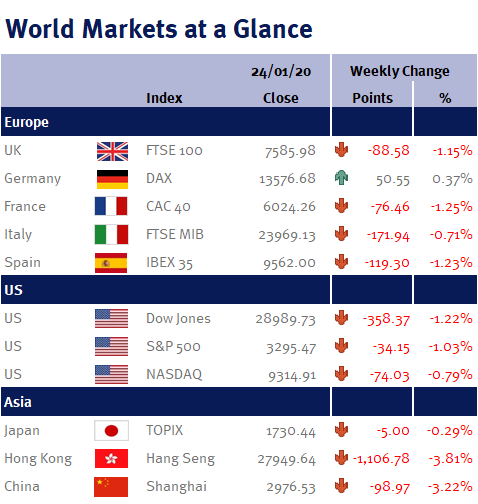Global equity markets fell this week on concerns China’s coronavirus could turn into a global pandemic and damage global growth.
Week ending 24th January 2020.
27th January 2020

While it is difficult to directly compare the SARS (in 2003) and MERS (in 2012) epidemics and how equity markets fared during and after those outbreaks (the US invaded Iraq in 2003; while 2012 was in the height of the euro crisis), if history is repeated a sustained period of weakness is unlikely.
However, China was a much smaller part of the world economy during previous episodes, so any economic slowdown in China this time will have a bigger impact on the global economy.
Consequently, the coronavirus is likely to keep equity market sentiment on edge until the spread of the virus is brought under control.
Coronavirus also weighed on commodities as China is a big buyer. For example, the price of a barrel of Brent crude fell 7% from $65 to nearly $60 despite the suspension of oil exports from Libya and supply disruptions in Iraq. Consequently, BP, Shell, BHP, Glencore and Rio Tinto were all among the worst performing UK equities over the week.
Additionally, luxury goods stocks (such as Burberry) and leisure companies (such as Carnival, IAG and TUI), fell amid fears the outbreak would disrupt travel and spending – especially as Chinese authorities have effectively shut down travel in and out of nearly a dozen cities in an attempt to contain the disease.
In the UK, Tuesday’s (21 January 2020) UK employment data showed that the economy added 208,000 jobs in the three months to the end of November – almost double consensus expectations. As for today’s (Friday 24 January 2020) data, the UK PMI reading signalled economic expansion as it jumped to 52.4 from 49.3 last month (the 50 level separates expansion from contraction).
While this week’s UK data has been positive (especially given the backdrop of Brexit and political uncertainty), it does little to change our view that the BoE still needs to cut interest rates, as the strong employment market isn’t translating into consumer spending or inflation.
Elsewhere, Luigi Di Maio resigned as leader of Italy’s Five Star Movement party, ahead of regional elections in Emilia-Romagna on Sunday (26 January 2020). A win for Matteo Salvini’s League party could put pressure on (and potentially result in) the collapse of the Italian coalition government between Five Star Movement and the Democratic Party, resulting in a snap national election.
Looking ahead to this coming week we will find out if the BoE cuts UK interest rates (the decision is far from certain). We also have a Fed monetary policy meeting (no change is expected in US interest rates). Additionally, we have US durable goods, new home sales, Q4 GDP, PCE Core Deflator; Eurozone Q4 GDP, CPI; and Japanese retail sales, industrial production and unemployment.
Elsewhere the Chinese stock market is closed for most of the week due to the Lunar New Year holiday.
We are also rapidly approaching the tax year end and so we would like to remind you that if you have not already taken advantage of your ISA allowance, now is the time to act. The current limit is £20,000 and if you don’t use it by 5 April 2020, you will lose it. Contact us using the details found in your email to start the process.
Investment Management Team
The latest market updates are brought to you by Investment Managers & Analysts at Wealth at Work Limited which is a member of the Wealth at Work group of companies.
Links to websites external to those of Wealth at Work Limited (also referred to here as 'we', 'us', 'our' 'ours') will usually contain some content that is not written by us and over which we have no authority and which we do not endorse. Any hyperlinks or references to third party websites are provided for your convenience only. Therefore please be aware that we do not accept responsibility for the content of any third party site(s) except content that is specifically attributed to us or our employees and where we are the authors of such content. Further, we accept no responsibility for any malicious codes (or their consequences) of external sites. Nor do we endorse any organisation or publication to which we link and make no representations about them.

